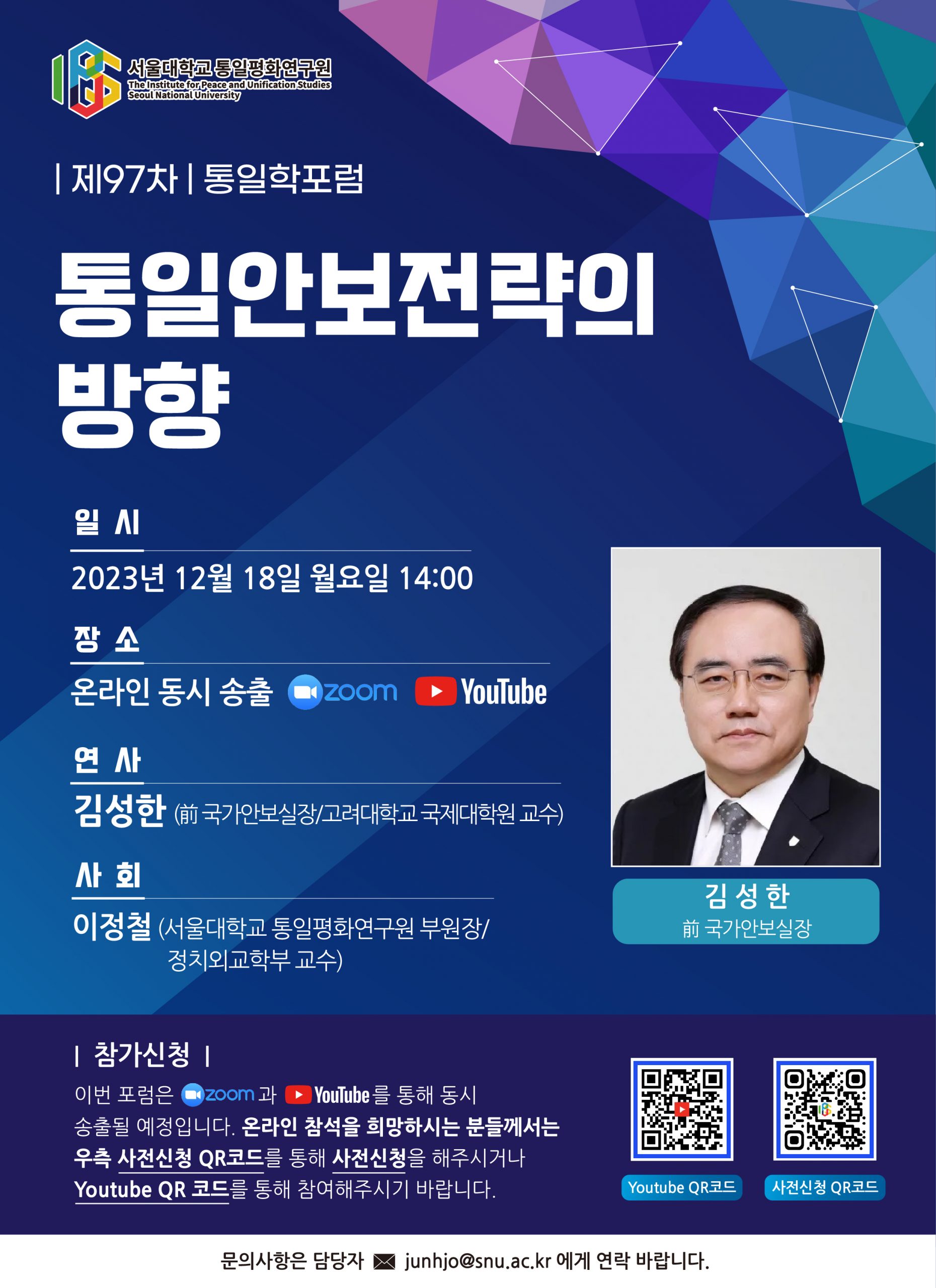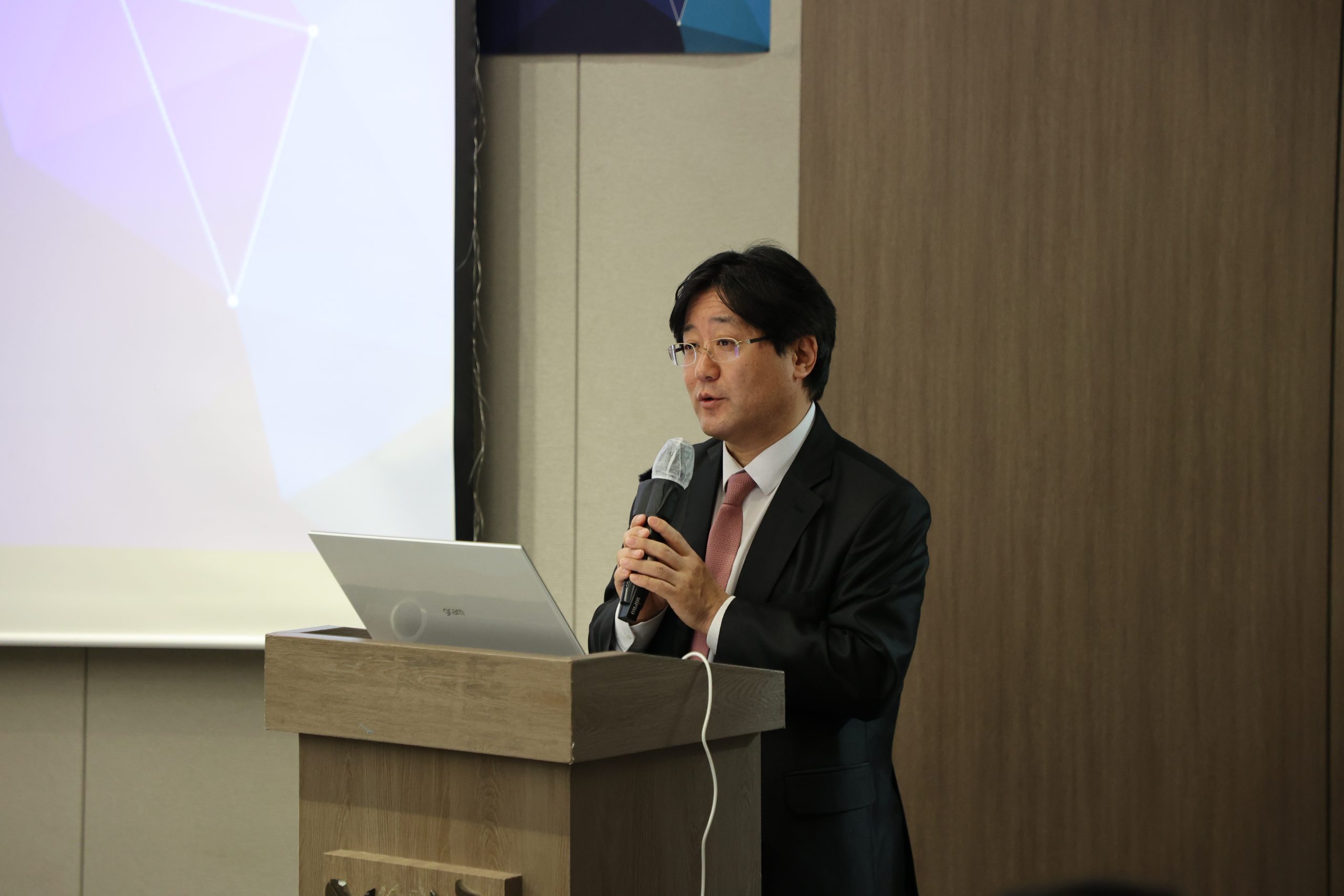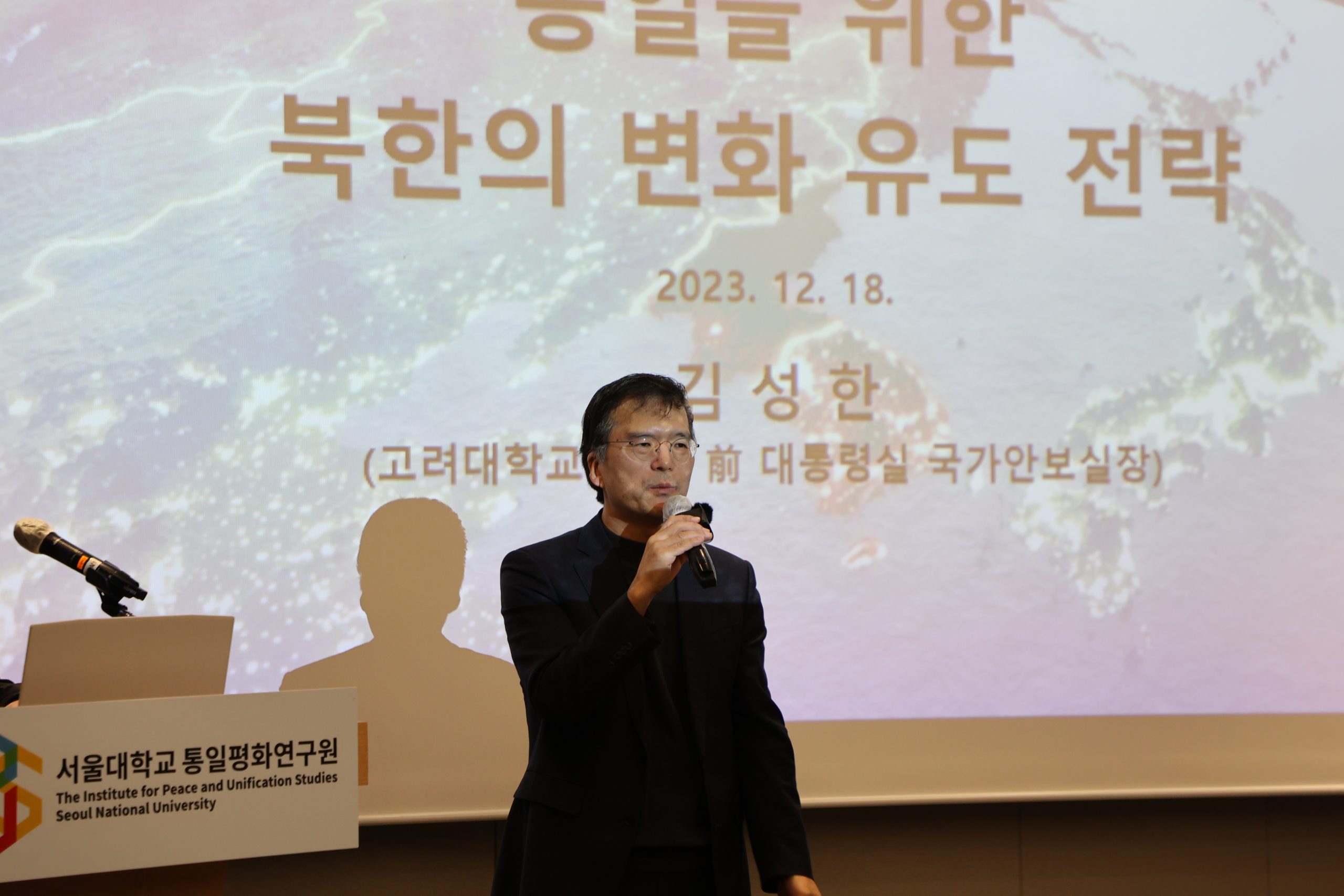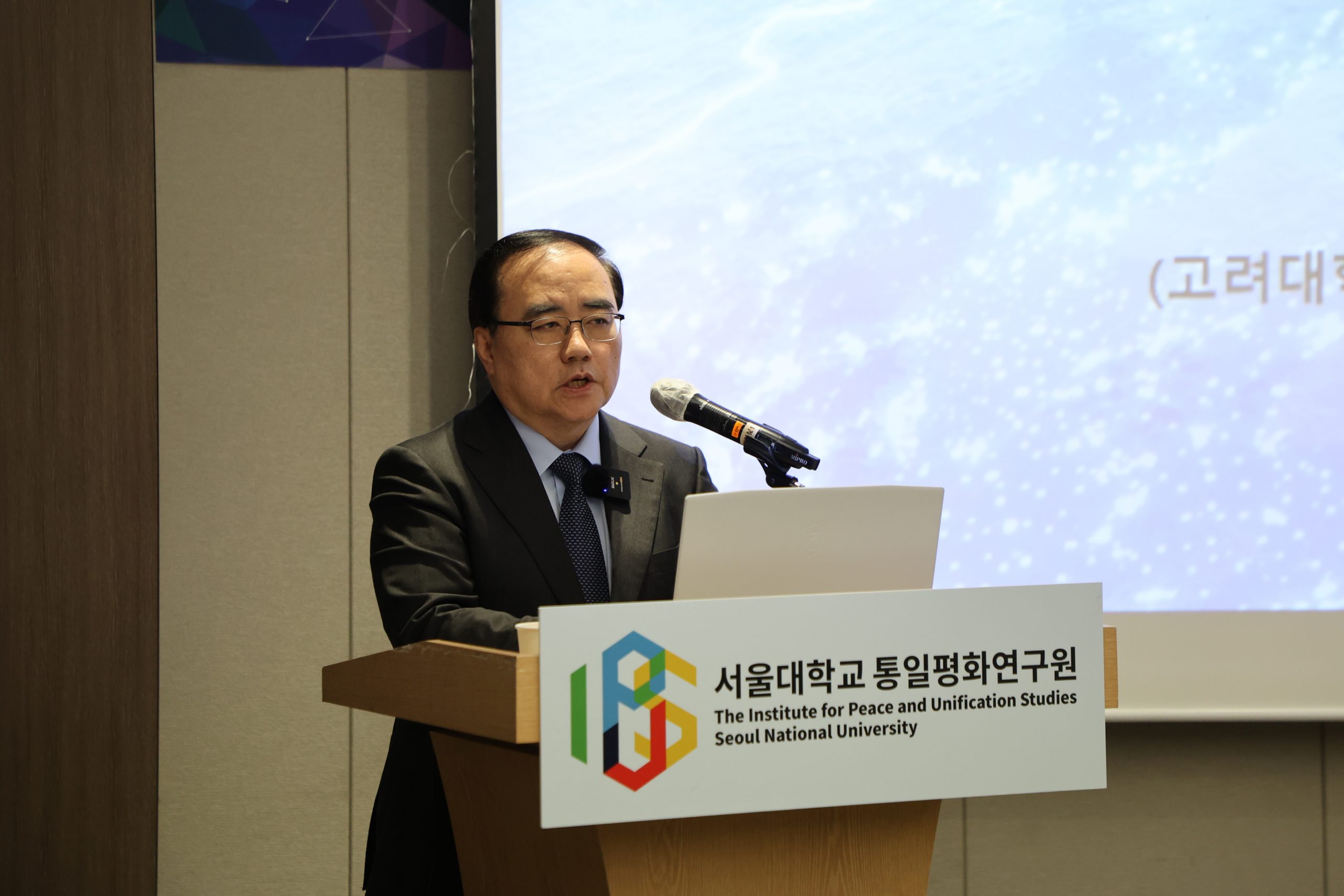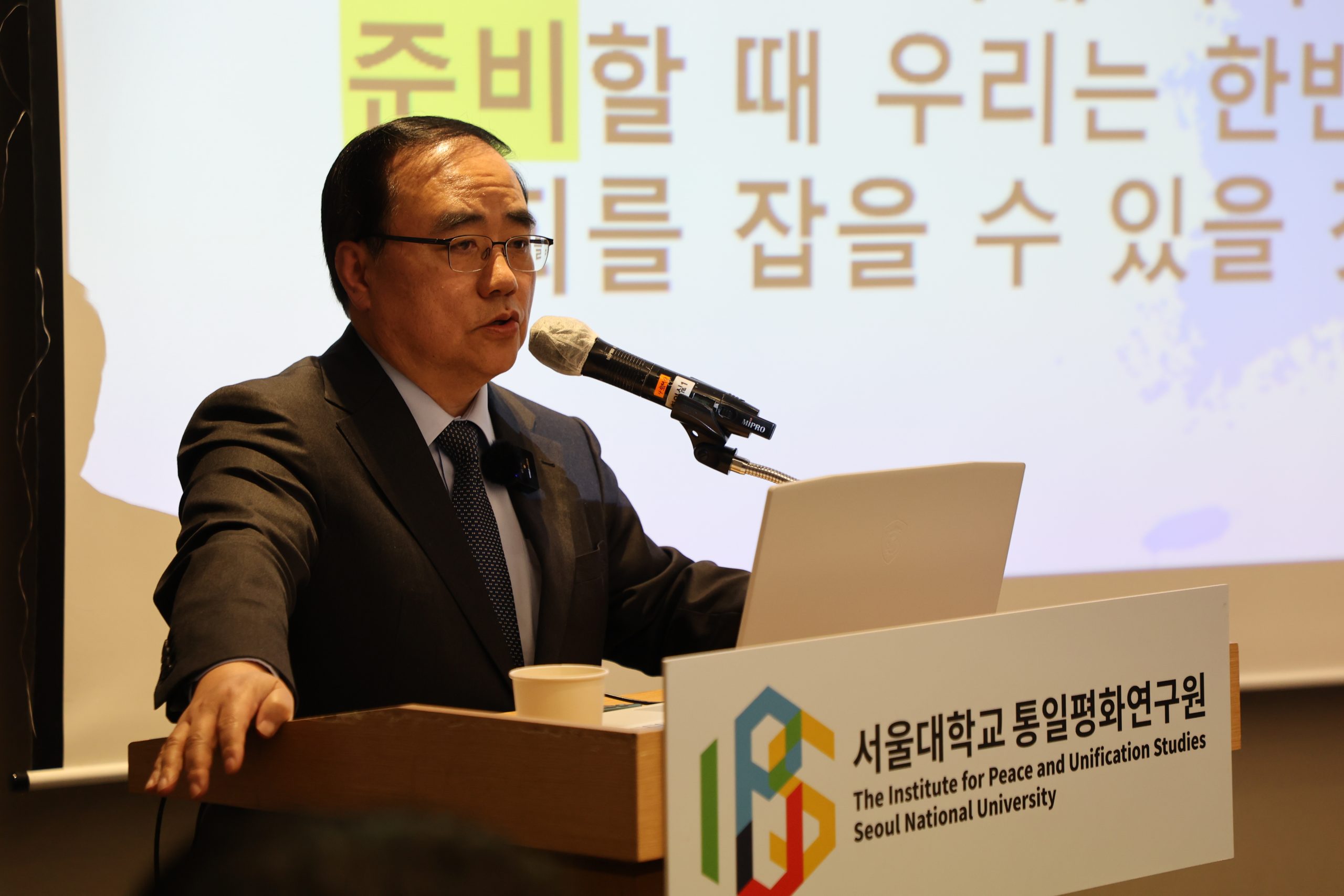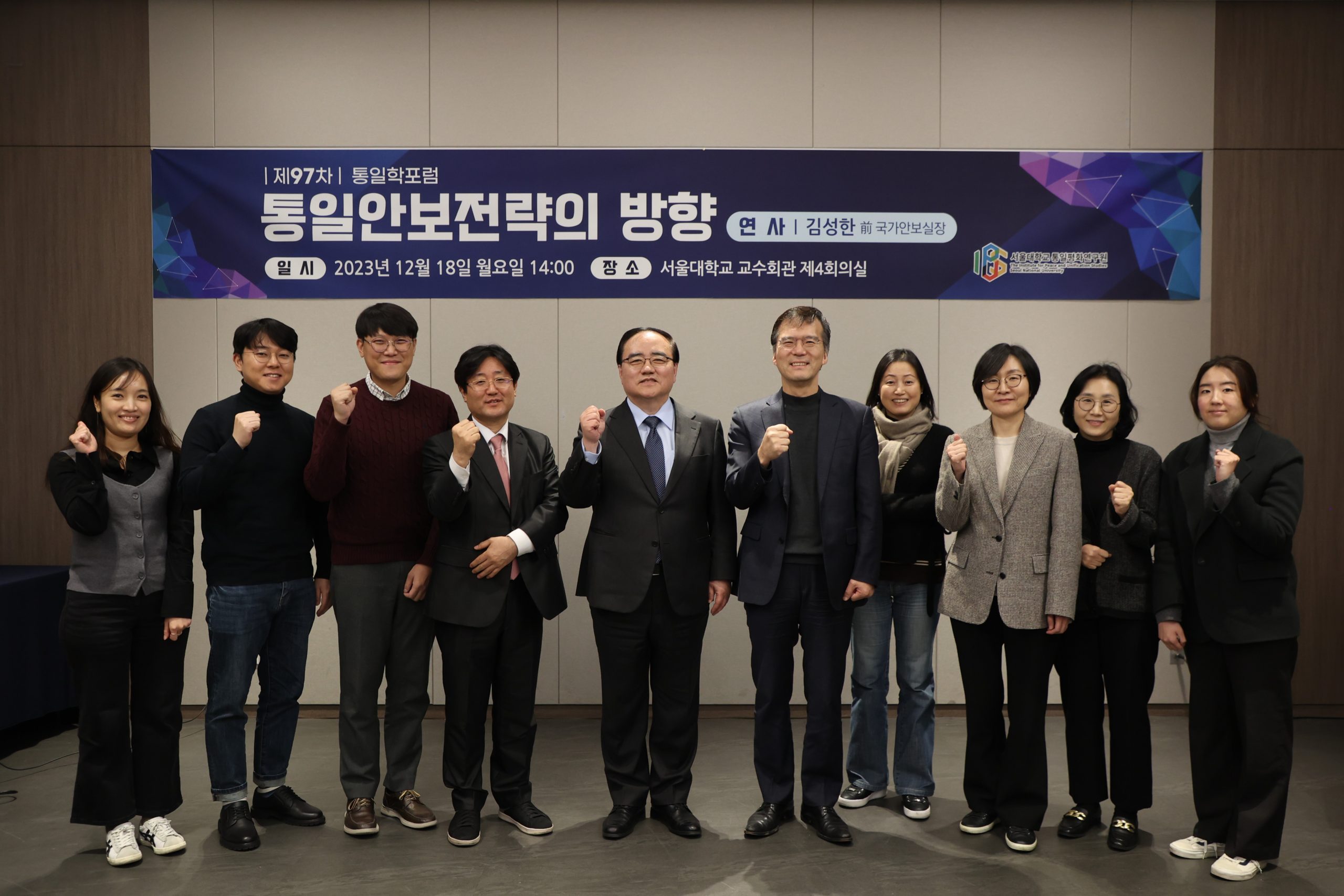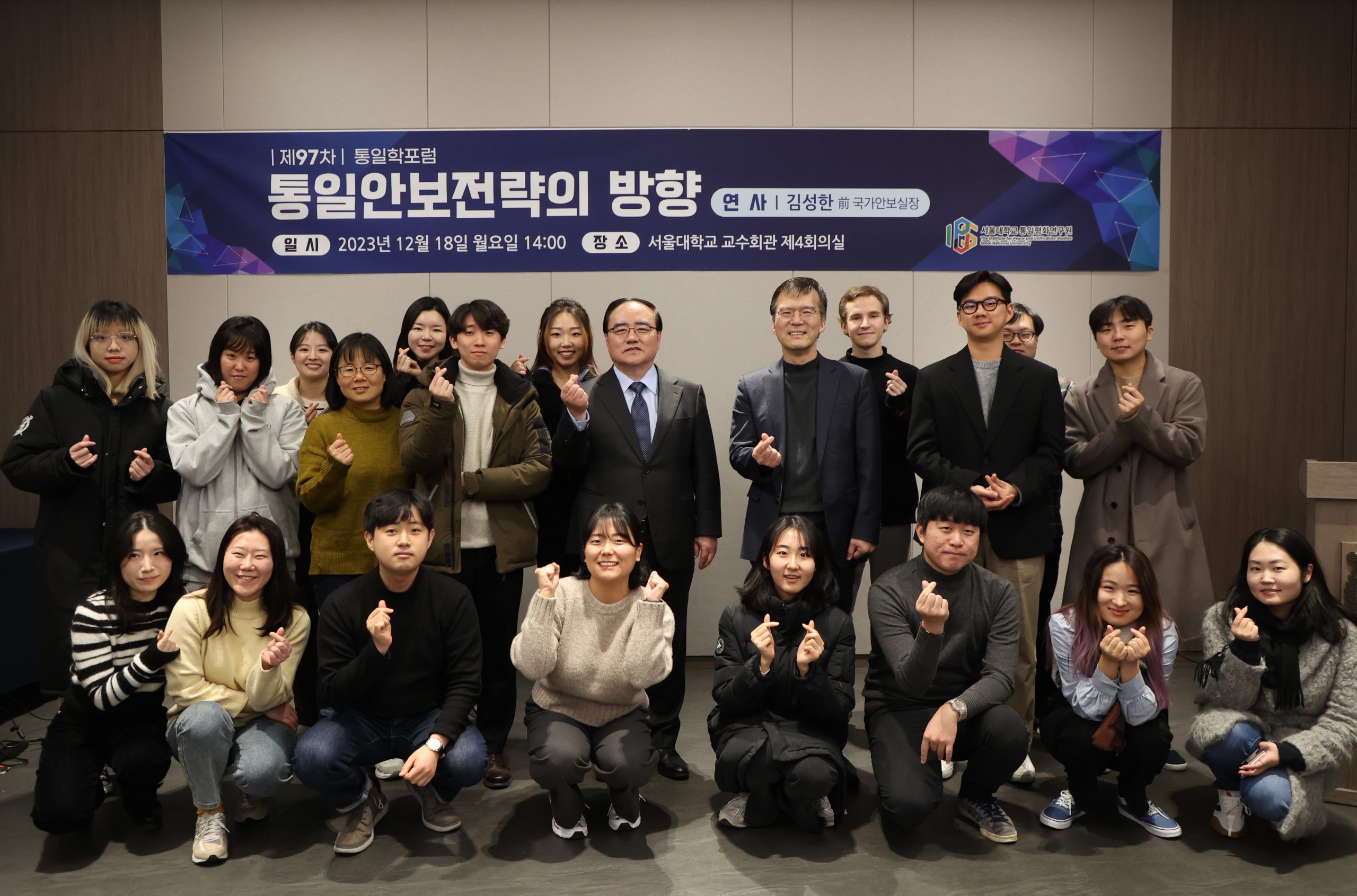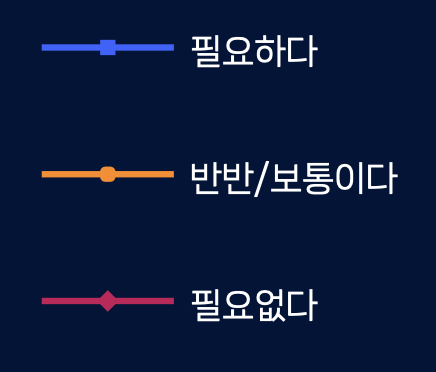[97th Unification Studies Forum] Direction of Unification Security Strategy
- Date&Time: Monday, December 18, 2023, 14:00 – 16:00 (KST)
- Venue: Room 4, Seoul National University Faculty House and Online Simulcast (ZOOM+Youtube)
- Moderator: Lee Jung-chul (Deputy Director, the Institute for Peace and Unification Studies at SNU/ Professor of Political Science and International Relations)
- Speaker: Kim, Sung-han (Former Director of National Security Office of the Office of the President/ Professor of Graduate School of International Studies, Korea University)
- Topic: Direction of Unification Security Strategy
The Institute for Peace and Unification Studies at Seoul National University(IPUS at SNU) hosted the 97th Unification Studies Forum on Monday, December 18, 2023, under the theme of ‘Direction of Unification Security Strategy’ with Kim Sung-han, former director of the National Security Office of the Office of the President. The “Unification Studies Forum” is an expanded and revamped version of the “Unification Policy Forum,” which was held 75 times from 2006 to 2020, and is now in its 97th session. The forum was moderated by Professor Lee Jung-chul, Vice Director of the Institute for Peace and Unification Studies at Seoul National University, and opened with a welcome speech by Professor Kim Bum-soo, Director of the Institute for Peace and Unification Studies at Seoul National University.
At the forum, Professor Kim sought to deliver a unified security strategy on ‘how to induce change in North Korea for reunification’. “Unification is a constitutional responsibility as stipulated in Article 4 of the Constitution, and it must be a unification through peaceful methods and a unification in which the liberal democratic basic order is guaranteed,” he said, emphasizing that “unification will bring a historical end to the Korean Peninsula.” “The prerequisite for ‘peaceful reunification’ is the transformation of North Korea,” he said, adding that he sees such transformation as “denuclearization, acceptance of the market economy through institutional opening, and a society that grants civil liberties.” In other words, he emphasized that “our unification strategy is a strategy to transform North Korea,” and argued that “this requires a diplomatic and security strategy that goes beyond neighboring countries and comprehensively considers the views of the international community.”
Kim then analyzed the interests of the U.S., China, Japan, Russia, and Europe, explaining that “the U.S. sees the reunification of the Korean Peninsula as positive in terms of 1) the triumph of liberal democratic values, 2) the elimination of challenges to the nonproliferation regime, and 3) the securing of leverage in public relations, but perceives 1) the weakening of the rationale for the U.S. military presence, 2) the weakening of the U.S.-ROK alliance due to cultural proximity, and 3) the decline in U.S. influence due to the establishment of multilateral security cooperation in Northeast Asia as negative effects of the reunification of the Korean Peninsula.” “China sees 1) reducing concerns and fears of war on the Korean Peninsula, 2) removing the burden of economic and military support for North Korea, and 3) demonstrating leadership in Northeast Asia’s economic integration as positive effects of Korean unification, but perceives 1) the loss of North Korea as a buffer zone, 2) the possibility of a continued U.S. military presence in South Korea, and 3) the full-scale influx of liberal democratic values through the Han River as negative effects.” “Japan perceives 1) the emergence of a unified country with shared values, 2) the benefits of Northeast Asian economic integration, and 3) opportunities for continental expansion as positive, and 1) the nationalization of the unified country, 2) China’s dominance of Northeast Asian economic integration, and 3) the weakening of the rationale for checking China as negative.” “Russia perceives 1) gas, railroads, Far East Russia, and Siberia, 2) shifting its strategic pivot to Asia, and 3) launching the Northeast Asia Multilateral Security Cooperation as positive aspects, while Russia perceives 1) Northeast Asian economic integration centered on China, Japan, and South Korea, 2) China’s growing assertiveness in the region, and 3) increased difficulties in managing the North-Russian border as negative aspects.” “Europe positively perceives 1) the disappearance of nuclear proliferation risks, 2) expanded opportunities for economic cooperation, and 3) increased liberal democratic value space, but negatively perceives 1) the possibility of economic Sino-Russian alignment in a unified Korea, 2) increased U.S.-China, Sino-Japan tensions due to China’s rising prominence, and 3) the emergence of a regional economic bloc in East Asia.”
“We need to manage these variables to induce North Korea’s change,” Kim argued, “and implement the will to denuclearize through a ‘bold initiative’ to lead North Korea to denuclearization through peaceful means, as proposed by the Yun Suk-yol government.” However, Kim stressed that “given the circumstances, it is unlikely that North Korea will respond to the ‘bold initiative,’ so strengthening and systematizing pressure on North Korea is a priority to bring North Korea to the negotiating table.” “It is necessary to systematize pressure in cyberspace by preparing a plan for rapid coordination with capable allies,” Kim stressed, adding, “We should ‘operationalize’ the deterrence of U.S.-South Korea expansion before the U.S. presidential election and accelerate working consultations so that we can properly understand the nuclear operation system.” In terms of the market economy and human rights promotion, Kim explained that “the most fundamental part of North Korea’s transformation is to change in a direction that improves human rights,” and emphasized that “denuclearization and human rights are two sides of the same coin, and should be promoted together.” “At the same time, we need to be prepared for a sudden change in North Korea,” said Kim Sung-han, who emphasized the need for a unified diplomatic strategy that is based on the U.S.-ROK alliance but that also finds ways to effectively manage the Chinese factor. He emphasized that “South Korea should take the initiative to reunify the Korean Peninsula and the U.S. should play the role of a facilitator to support it.” “We should join the United Nations organization and actively participate in its operations, and make it our strategic asset when the opportunity for reunification comes,” he explained.
Finally, Mr. Kim explained, “In terms of our preparations for reunification, we must first promote our vision to the international community that ‘a reunified Korea will uphold the non-nuclear principle, promote practical peace through alliances and multilateral security cooperation, and open an era of prosperity by paving the way for economic integration in Northeast Asia. “We need to raise awareness among the Korean people that peace on the Korean Peninsula must be ‘real peace’ and actively engage in diplomacy with our neighbors,” he said, “and emphasize that the ‘coexistence’ of the U.S.-led alliance system and multilateral security cooperation in Northeast Asia after reunification is the vision for security cooperation in Northeast Asia.” “An important factor that determines the future of the Korean Peninsula is our ability to solve our own problems,” he said, adding that “this ability can only be exercised through thorough preparations for reunification.” In conclusion, Kim emphasized that “as a liberal democracy, we will be able to seize the historic opportunity of reunifying the Korean Peninsula if we have a three-dimensional strategy that utilizes a network of allies and similarly situated countries with the right orientation of contributing to global freedom, peace, and prosperity, and if we thoroughly prepare based on various scenarios.”

